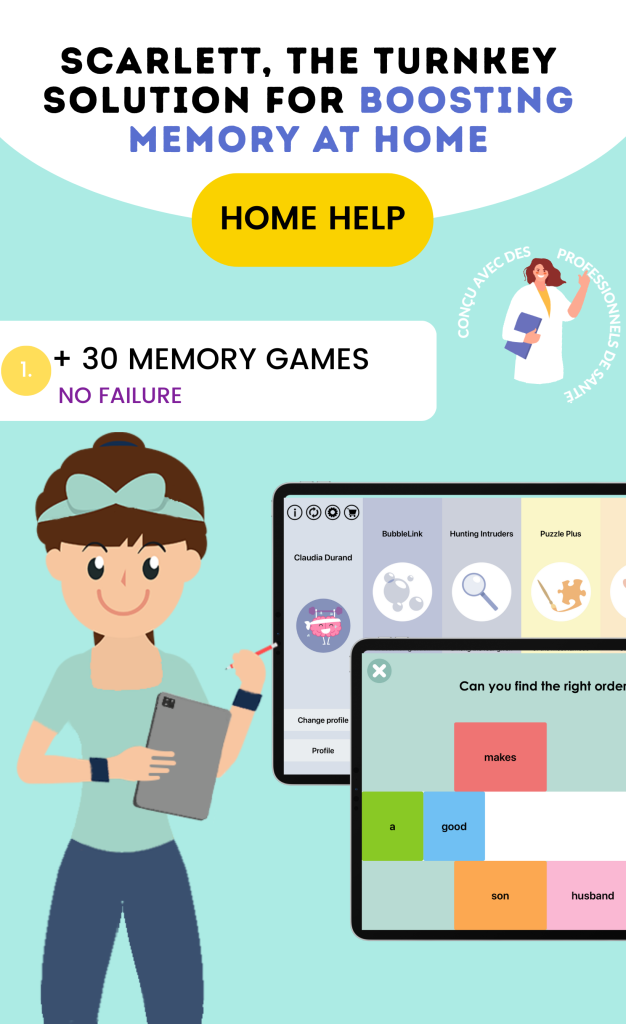Private Life / Professional Life: Disconnecting After a Difficult Day
In our hyper-connected world, disconnecting has become a necessity rather than a luxury. We are constantly bombarded with information, whether through social media, emails, or endless notifications. This information overload can quickly lead to a state of chronic stress, making concentration and productivity difficult.
By taking the time to disconnect, we give our minds the chance to rest and recharge. This helps us restore emotional balance and improve our overall well-being. Disconnecting does not just mean turning off our electronic devices; it is also a state of mind, a way of giving ourselves permission not to be constantly available.
Focusing on the present moment and enjoying the little things in life—spending time with friends, reading a book, or engaging in physical activity—are essential moments of disconnection for our mental health.
🎓 Tools to Help You Disconnect and Reset
Calming activities, brain-training games, and practical resources to support your daily well-being.
Discover our tools →📋 Table of Contents
- 1. Summary
- 2. Consequences of a Difficult Day on Personal Life
- 3. Signs of Stress to Watch For
- 4. Decompression Activities to Prioritize
- 5. Setting a Boundary Between Work and Personal Life
- 6. Communication with Loved Ones After a Difficult Day
- 7. Impact of Disconnecting on Mental Health
- 8. Benefits of Meditation and Relaxation
- 9. Methods to Relax and Recharge
- 10. Tips for Managing Stress at Work
- 11. Finding a Balance Between Personal Life and Work
Summary
Key points to remember:
- It is important to regularly disconnect to maintain our mental health and well-being.
- A difficult day at work can have negative consequences for personal life, particularly in terms of stress and communication with loved ones.
- It is essential to monitor the signs of stress, such as irritability, fatigue, and sleep problems.
- To relax, it is advisable to prioritize decompression activities such as meditation, relaxation, and leisure activities.
- It is crucial to set a clear boundary between work and personal life to maintain our balance and well-being.
The Consequences of a Difficult Day on Personal Life
A difficult day at work can have significant consequences for our personal life. When we come home after a long day, it is common for stress and fatigue to accompany us. This can affect our mood, our interactions with loved ones, and even our physical health.
The built-up tensions can translate into arguments with our partners or a lack of energy to spend time with our children. Moreover, this emotional fatigue can lead us to isolate ourselves. Instead of sharing our worries with our loved ones, we may choose to withdraw into our own world, creating a gap between us and those around us.
It is therefore crucial to recognize the impact that our difficult days can have on our personal life and to learn to cope with these emotions to maintain our relationships.
- Mood: Irritability and frustration can increase, affecting our behavior towards our loved ones.
- Emotional fatigue: A feeling of exhaustion can make it difficult to engage in family or social activities.
- Isolation: The tendency to withdraw can lead to deteriorating relationships and a sense of loneliness.
The Signs of Stress to Watch Out For
It is essential to pay attention to the signs of stress that may manifest in our daily lives. Among the most common symptoms are irritability, chronic fatigue, and sleep problems. If we notice that we are having trouble falling asleep or that we often wake up at night, this may indicate that our mind is overloaded.
Other signs include frequent headaches, muscle pain, or digestive issues. These physical manifestations of stress should not be taken lightly, as they often reflect an emotional imbalance that requires special attention.
- Changes in appetite: An increase or decrease in appetite can indicate underlying stress.
- Concentration problems: Difficulty concentrating can affect our performance at work and at home.
- Intense emotions: Mood swings or frequent crying spells can be indicators of accumulated stress.
Decompression Activities to Prioritize
To counteract the effects of stress, there are several decompression activities that we can integrate into our daily routine. Regular physical exercise is one of the best ways to relieve built-up tension. Whether it’s running, yoga, or even a simple walk outdoors, exercise helps release endorphins, often referred to as “happiness hormones.”
Creativity is also an excellent way to relax. Whether it’s painting, writing, or making music, these activities allow us to express our emotions and channel our energy positively. Additionally, taking the time to meditate or practice breathing exercises can help calm our minds and reduce stress.
- Walking: Spending time in nature can help reduce stress and improve our mood.
- Gardening: Growing plants can be a relaxing and rewarding activity.
- Arts and crafts: Engaging in creative projects can provide a welcome escape.
- Mindfulness practices: Meditation and yoga promote a calm and focused state of mind.
How to Set a Boundary Between Work and Personal Life
Setting a clear boundary between our professional life and personal life is crucial for maintaining a healthy balance. This begins with defining specific working hours and adhering to them as much as possible. By avoiding responding to professional emails outside of work hours, we can create mental space to focus on our personal lives.
It is also important to communicate these boundaries to our colleagues and supervisors. By letting them know that we will not be available outside of work hours, we can reduce expectations and minimize work-related stress. Finally, setting up a specific workspace at home can also help create a physical separation between work and personal life.
- Plan your day: Create a precise schedule for your professional and personal tasks.
- Use time management tools: Apps can help you stay organized and respect your boundaries.
- Create a separate workspace: If possible, dedicate a specific spot at home for work.
- Set technology-free moments: Give yourself screen-free breaks to recharge.
Communication with Loved Ones After a Difficult Day
After a difficult day, it is essential to open communication with our loved ones. Sharing our experiences and emotions can not only lighten our emotional load but also strengthen our relationships. By talking about what has troubled us at work, we allow our loved ones to better understand our state of mind and offer their support.
It is also important to listen to the concerns of our loved ones. Communication is a mutual exchange, and by being attentive to the needs of others, we can create an environment conducive to understanding and empathy. Taking the time to talk about our respective days can strengthen family and friendship bonds.
- Listen actively: Show interest in what your loved ones have to say.
- Share your emotions: Be honest about how you feel without fear of judgment.
- Plan family moments: Reserve quality time together to strengthen your bonds.
- Use games or activities: Board games or fun activities can facilitate communication.
The Impact of Disconnecting on Mental Health
Disconnecting has a profound impact on our mental health. By taking the time to disconnect from digital distractions and professional obligations, we give our minds the chance to rest and regenerate. This can reduce anxiety levels and improve our overall mood.
Moreover, disconnecting promotes mindfulness. By being present in the moment, we learn to appreciate the little things in life that often go unnoticed in our busy daily lives. This regular practice can strengthen our resilience against stress and improve our emotional well-being.
Activities such as “COCO THINKS and COCO MOVES” for children can also help create moments of disconnect and relaxation, contributing to better emotional balance.
- Improvement in concentration: Disconnecting allows us to refocus on important tasks.
- Strengthening of relationships: Spending time without screens fosters human interactions.
- Reduction of anxiety: Less exposure to social media can decrease social comparison and stress.
The Benefits of Meditation and Relaxation
Meditation and relaxation techniques are powerful tools for managing stress and improving our mental well-being. Meditation helps calm the mind by focusing on breathing or visualizing soothing images. This helps reduce anxiety and promote a positive state of mind.
Relaxation techniques, such as yoga or deep breathing exercises, can also contribute to reducing physical and emotional tensions. By incorporating these practices into our daily routine, we can create a space conducive to relaxation and recharging.
- Guided meditation: Use apps or videos to guide you in your practice.
- Mindful breathing: Focus for a few minutes on your breathing to calm your mind.
- Mindfulness meditation: Practice observing your thoughts without judgment.
- Yoga: Combine physical movements and breathing for a relaxing effect.
Methods to Relax and Recharge
There are various methods we can adopt to relax and recharge after a difficult day. Taking a warm bath with essential oils can be an excellent way to release built-up tension in the body. Similarly, listening to soothing music or reading a good book can provide a welcome escape.
We can also explore creative activities, such as gardening or crafting, that allow us to express our creativity while providing a positive distraction. Finally, spending time in nature can have a calming effect on our mind and body.
- Journaling: Writing down your thoughts can be therapeutic and liberating.
- Gratitude practices: Note three positive things each day to cultivate a positive mindset.
- Cooking: Preparing a dish you enjoy can be a relaxing and satisfying activity.
- Visualization: Imagine yourself in a peaceful place to promote relaxation.
Tips for Better Managing Stress at Work
To better manage stress at work, it is essential to follow some practical tips. First, creating a list of priority tasks can help structure our day and prevent mental overload. By focusing on one task at a time, we can improve our productivity while reducing stress.
Taking regular breaks is also crucial to maintaining our energy levels throughout the day. Even a few minutes to stretch or take a short walk can make a big difference to our overall well-being. Finally, learning to say no when necessary can also help reduce stress from excessive responsibilities.
- Manage your time: Use techniques like the Pomodoro method to structure your work time.
- Set boundaries: Don’t overload your schedule with too many meetings or commitments.
- Do relaxation exercises: Take a few minutes to breathe deeply between tasks.
- Seek support: Don’t hesitate to ask for help from your colleagues when you need it.
The Search for a Balance Between Personal Life and Work
The search for a balance between personal life and work is a constant challenge in our modern society. It is important to recognize that this balance is not static; it evolves depending on personal and professional circumstances. By being flexible and adjusting our priorities over time, we can find a rhythm that works for us.
Ultimately, it is about making a conscious choice. By taking the time to evaluate our personal and professional needs, we can set healthy boundaries that promote our overall well-being. This balance is essential, not only for our mental health but also for our relationships with those around us.
- Regularly assess your priorities: Take time to reflect on what is truly important to you.
- Set realistic goals: Avoid overloading yourself with unrealistic expectations.
- Create a routine: Establish a daily routine that includes time for work and relaxation.
- Practice self-care: Take care of yourself through exercise, meditation, or any activity that brings you joy.










